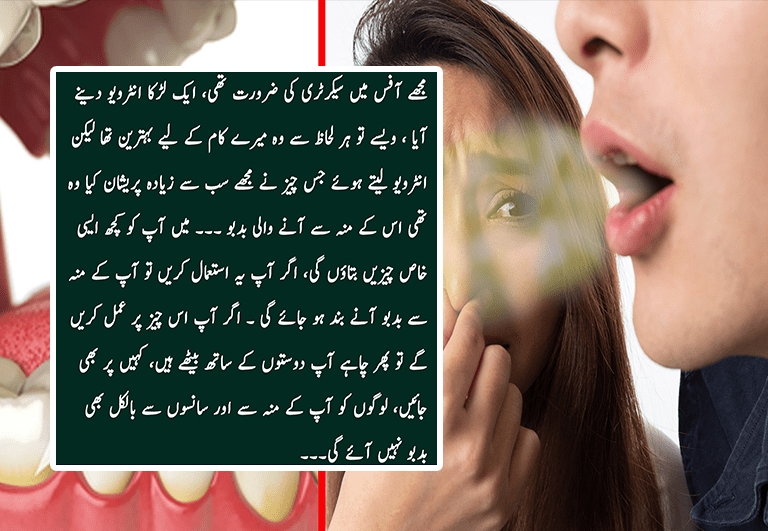Causes of bad breath and Cure
Bad breath, also known as halitosis, can be caused by various factors. Here are some common causes and ways to address them:
Poor Oral Hygiene
Insufficient brushing, flossing, and tongue cleaning can lead to the buildup of bacteria in the mouth, causing bad breath. To address this, maintain a consistent oral hygiene routine:
Brush your teeth at least twice a day, preferably after meals.
Use dental floss to clean between teeth and remove food particles.
Scrape or brush your tongue to remove bacteria.

Food
Certain foods like garlic, onions, and strong spices can lead to temporary bad breath. These odors can be released into the bloodstream and expelled through the lungs. Brushing, flossing, and using mouthwash can help mask these odors.
Dry Mouth (Xerostomia)
Saliva helps cleanse the mouth by neutralizing acids and washing away food particles. A dry mouth can lead to bad breath because it reduces saliva flow. Stay hydrated, chew sugar-free gum, and use artificial saliva products if necessary.
Tobacco and Alcohol
Smoking and tobacco use can lead to foul-smelling breath. Alcohol can also dry out the mouth. Quitting tobacco and moderating alcohol consumption can improve breath odor.

Dental Issues
Cavities, gum disease (gingivitis or periodontitis), and oral infections can release unpleasant odors. Regular dental check-ups and proper treatment of any dental issues are crucial.
Respiratory Infections
Infections in the respiratory tract, such as sinus infections, bronchitis, or pneumonia, can lead to bad breath. Treating the underlying infection will help eliminate the odor.
Medical Conditions
Certain medical conditions can contribute to bad breath, including diabetes, liver disease, kidney disease, and acid reflux. Treating the underlying condition can help alleviate bad breath.
Medications
Some medications can lead to dry mouth, which in turn causes bad breath. If you suspect your medication is causing this issue, consult your healthcare provider for potential solutions.
Dieting and Fasting
Low-carbohydrate diets and fasting can cause the body to break down fat for energy, leading to the release of chemicals called ketones, which can cause bad breath. Balancing your diet and staying hydrated can help mitigate this.
Mouthwashes with Alcohol
Alcohol-based mouthwashes can dry out the mouth, exacerbating bad breath in the long run. Consider using an alcohol-free mouthwash with antibacterial properties.
To effectively get rid of bad breath:
Maintain Good Oral Hygiene
Brush and floss regularly, and use an antibacterial mouthwash if recommended by your dentist.
Stay Hydrated
Drink plenty of water to keep your mouth moist and help wash away bacteria and food particles.
Chew Sugar-Free Gum
Chewing gum stimulates saliva production, which can help combat dry mouth.
Avoid Tobacco and Alcohol
If you smoke or use tobacco, consider quitting. Limit alcohol intake.
Visit Your Dentist
Regular dental check-ups are crucial for identifying and treating any dental issues.
Treat Underlying Medical Conditions
If you suspect a medical condition is causing bad breath, consult a healthcare professional.
Eat a Balanced Diet: Include fruits, vegetables, and fiber-rich foods in your diet to promote good oral health.
If you’ve tried these measures and bad breath persists, it’s a good idea to consult a dentist or healthcare provider to rule out any underlying medical conditions and receive personalized advice.





